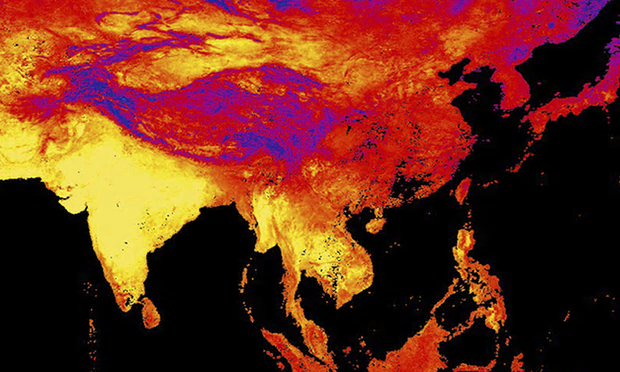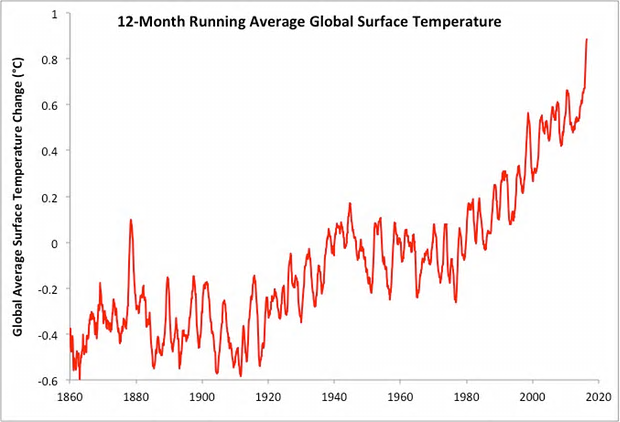January 2017 was third-warmest January on record
January 2017 was the third warmest January in 137 years of modern record-keeping, according to a monthly analysis of global temperatures by scientists at NASA's Goddard Institute for Space Studies (GISS) in New York.
Last month's temperature was 0.20 degrees Celsius cooler than the warmest January in 2016. However, it was 0.92 degrees Celsius warmer than the mean January temperature from 1951-1980.
Two of the three top January temperature anomalies have been during the past two years. 2016 was the hottest on record, at 1.12 degrees Celsius warmer than the January mean temperature, followed by 2007 at 0.96 degrees Celsius warmer. January 2017 placed third.
Read more at https://climate.nasa.gov/news
Last month's temperature was 0.20 degrees Celsius cooler than the warmest January in 2016. However, it was 0.92 degrees Celsius warmer than the mean January temperature from 1951-1980.
Two of the three top January temperature anomalies have been during the past two years. 2016 was the hottest on record, at 1.12 degrees Celsius warmer than the January mean temperature, followed by 2007 at 0.96 degrees Celsius warmer. January 2017 placed third.
Read more at https://climate.nasa.gov/news
Last Month, July 2016 Was the Hottest July on Record, Ever. Period
Last month, once again, we witness a never experienced hottest month ever. The average high temperature was over 90 degrees for July.
Check out the Sounding the Alarm page. I've posted the 7-day forecasts for every week in July and count the number of 90 degree days listed. In addition, a number of days the temperature was above 100 degrees, and are not shown on the forecasts.
So, this latest report is not a surprise. Check out the article at The Weather Channel's Climate and Weather - linked below.
We just broke the record for hottest year, nine straight times
Earth’s record hottest 12 consecutive months were set in each month ending in September 2015 through May 2016
We just broke the record for hottest year, nine straight times
Earth’s record hottest 12 consecutive months were set in each month ending in September 2015 through May 2016
Earth’s record hottest 12 consecutive months were set in each month ending in September 2015 through May 2016
May goes down as Earth's hottest on record: NASA
June 14, 2016
Recent predictions by US scientists anticipate that 2016 will go down as Earth's hottest year on record—on the heels of record-setting years in 2014 and 2015.
May's temperatures broke global records yet again, as the northern hemisphere finishes its hottest spring on record, statistics released Tuesday by NASA showed.
The Arctic in particular experienced abnormal heat, causing Arctic sea ice and the Greenland ice sheet to start melting unusually early, said NASA.
Alaska recorded its warmest spring on record by a wide margin, and in Finland the average May temperature was between three and five degrees warmer than usual in most regions, according to data from the Finnish Meteorological Institute.
"The state of the climate so far this year gives us much cause for alarm," said David Carlson, Director of Geneva's World Climate Research Programme, in a release from the World Meteorological Association.
Now dissipated, the El Nino weather pattern factored into 2016's record-setting heat, but meteorologists say greenhouse gases emitted from human activities remain the underlying cause.
"The super El Nino is only partly to blame. Abnormal is the new normal," Carlson added.
Strong El Nino temperatures did cause more than 53 percent of Australia to experience its warmest autumn on record.
May's exceptional warmth was accompanied by extreme weather events including abnormally heavy rains throughout Europe and the southern United States, as well as "widespread and severe" coral reef bleaching.
Austraila's Bureau of Meteorology blamed warm waters for "unprecedented" bleaching of the Great Barrier Reef.
The US National Oceanic and Atmospheric Administration (NOAA) is expected to announce complete global May temperature records in the coming days.
Recent predictions by US scientists anticipate that 2016 will go down as Earth's hottest year on record—on the heels of record-setting years in 2014 and 2015.
In late May, NOAA announced that April also registered its highest temperatures ever, marking the twelfth consecutive month of record heat.
The first four months of 2016 were the warmest globally in 136 years.
Read more at: http://phys.org/news/2016-06-earth-hottest-nasa.html#jCp
March 2016 Was the Most Abnormally Warm Month on Record For the World, NOAA Says
Published: Apr 19 2016 12:00 PM EDT
By Jon Erdman
weather.com
Earth's global temperatures in March 2016 were the most abnormally warm on record for any month, according to NOAA. This is the second month in a row that this remarkable feat has occurred.
NOAA's global State of the Climate report released Tuesday found March's temperature over the Earth's surface was 1.22 degrees Celsius above the 20th century average, not only crushing the warmest March in the 137-year period of record set just one year prior, but also the largest temperature anomaly of any month in NOAA's database dating to 1880.
The previous record for the largest temperature anomaly on record in a given month was just set this past February. March beat out that record by a narrow margin of 0.01 degrees Celcius.
March 2016 is also the eleventh consecutive month in a row that the earth has recorded its warmest respective month on record.
****************************************************
Continue reading at:
https://weather.com/news/climate/news/record-warmest-march-global-2016
June 14, 2016
Recent predictions by US scientists anticipate that 2016 will go down as Earth's hottest year on record—on the heels of record-setting years in 2014 and 2015.
May's temperatures broke global records yet again, as the northern hemisphere finishes its hottest spring on record, statistics released Tuesday by NASA showed.
The Arctic in particular experienced abnormal heat, causing Arctic sea ice and the Greenland ice sheet to start melting unusually early, said NASA.
Alaska recorded its warmest spring on record by a wide margin, and in Finland the average May temperature was between three and five degrees warmer than usual in most regions, according to data from the Finnish Meteorological Institute.
"The state of the climate so far this year gives us much cause for alarm," said David Carlson, Director of Geneva's World Climate Research Programme, in a release from the World Meteorological Association.
Now dissipated, the El Nino weather pattern factored into 2016's record-setting heat, but meteorologists say greenhouse gases emitted from human activities remain the underlying cause.
"The super El Nino is only partly to blame. Abnormal is the new normal," Carlson added.
Strong El Nino temperatures did cause more than 53 percent of Australia to experience its warmest autumn on record.
May's exceptional warmth was accompanied by extreme weather events including abnormally heavy rains throughout Europe and the southern United States, as well as "widespread and severe" coral reef bleaching.
Austraila's Bureau of Meteorology blamed warm waters for "unprecedented" bleaching of the Great Barrier Reef.
The US National Oceanic and Atmospheric Administration (NOAA) is expected to announce complete global May temperature records in the coming days.
Recent predictions by US scientists anticipate that 2016 will go down as Earth's hottest year on record—on the heels of record-setting years in 2014 and 2015.
In late May, NOAA announced that April also registered its highest temperatures ever, marking the twelfth consecutive month of record heat.
The first four months of 2016 were the warmest globally in 136 years.
Read more at: http://phys.org/news/2016-06-earth-hottest-nasa.html#jCp
March 2016 Was the Most Abnormally Warm Month on Record For the World, NOAA Says
Published: Apr 19 2016 12:00 PM EDT
By Jon Erdman
weather.com
Earth's global temperatures in March 2016 were the most abnormally warm on record for any month, according to NOAA. This is the second month in a row that this remarkable feat has occurred.
NOAA's global State of the Climate report released Tuesday found March's temperature over the Earth's surface was 1.22 degrees Celsius above the 20th century average, not only crushing the warmest March in the 137-year period of record set just one year prior, but also the largest temperature anomaly of any month in NOAA's database dating to 1880.
The previous record for the largest temperature anomaly on record in a given month was just set this past February. March beat out that record by a narrow margin of 0.01 degrees Celcius.
March 2016 is also the eleventh consecutive month in a row that the earth has recorded its warmest respective month on record.
****************************************************
Continue reading at:
https://weather.com/news/climate/news/record-warmest-march-global-2016

